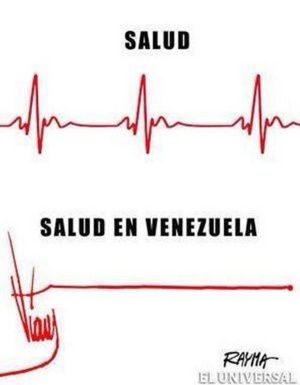Rayma Suprani’s dismissal revives rumors about ‘El Universal’ newspaper’s new owners

The cartoon that got Rayma Suprani fired: the top line reads “Health,” while the bottom line reads “Health in Venezuela,” above a copy of Hugo Chávez’s signature.
Rayma Suprani, one of Venezuela’s best-known cartoonists, was fired from El Universal newspaper last week for publishing a drawing that portrayed Hugo Chávez’s signature as a flatline on a hospital heart-rate monitor. The new and mysterious owners of the publication where Suprani worked for 19 years decided that the cartoonist, one of the Bolivarian regime’s harshest critics, had crossed the line with her latest illustration. Her dismissal has revived rumors about the identity of the newspaper’s new owners. The 105-year-old daily is one of the nation’s oldest publications and Suprani had become one of its most recognizable symbols.
After El Universal changed hands in a private deal in July, the engineer and new Executive President Jesús Abreu became the visible face of the company. Abreu is the brother of Antonio Abreu, the creator of Venezuela’s successful national orchestra and a former executive at several economic groups associated with Venezuela’s bolibourgeoisie – the new moneyed class that has built its fortune by doing business with the Chavista regime. Abreu has said in various public appearances that the newspaper’s new managers would not affect editorial decisions.
But the management’s first step was to purge its roster of columnists, saying they were “restructuring” the opinion pages. Then, in mid-August, the censorship of a report from Ciudad Guayana (southeast Venezuela) about a labor dispute at the state’s largest iron and steel works exasperated the newsroom. In the piece, the writer quoted union members who had unkind words to say about the regime’s number two, Diosdado Cabello.
Now Suprani’s dismissal has not only alarmed journalists, but also given readers more proof of the gradual shift in the paper’s political stance. For decades, El Universal was the voice of the most conservative business sectors. But “since the change in management … thousands of readers [who were] faithful for decades have stopped buying the paper,” editors said in a statement published after Suprani’s removal. “And the few advertisers left in this country who can afford to invest will lose all interest … if censorship continues.”
The 105-year-old daily is one of the nation’s oldest papers and Suprani was one of its most recognizable symbols
Suprani told El PAÍS via telephone that, given her long battle with the country’s political powers, “since they started to dismantle the newspaper, I became vulnerable.” Yet she decided to keep going, conscious of the need to preserve a space for freedom of expression “that I got through my own hard work.” She did not contemplate making any concessions regarding her “views or liberties. Right now, within the newspaper, there is a tacit call to give up. But if the new owners thought I was going to toss around more banal topics in order to keep my job, they thought wrong.”
The cartoon published on Wednesday referred to the current health crisis in Venezuela. Beneath a representation of a normal electrocardiogram labeled “Health,” Suprani placed late President Hugo Chávez’s signature ending in a flatline under the heading “Health in Venezuela.” As Venezuelans grapple with outbreaks of dengue fever and chikungunya, Rayma tried to point out that the collapse of the healthcare system is not a random circumstance but the consequence of a gradual breakdown over the years.
“Selling a private company should be the most normal thing in the world,” Suprani said. “It’s like when someone sells a home. It’s natural for the new owner to want to rearrange it according to their tastes. But what the new owners are doing is an insult to the intelligence of journalists and readers. Abreu is nothing more than a carcass.”
Ostensibly, Epalisticia, a mysterious investment firm based in Madrid, is the new owner of El Universal. Its shareholders have legal names but no information about them can be found. In Caracas, people are betting on which bolibourgeois – if not the Nicolás Maduro administration itself – is pulling the strings of the newspaper.
El Universal is the third independent media network to be sold on the Venezuelan market in less than a year. Cadena Capriles, which published the country’s most popular paper, Últimas Noticias, and Globovisión, a 24-hour news channel that was the regime’s bête noire, were also sold. After the acquisitions, the editorial content at both networks lost its spark. A group of investors from the financial sector bought Globovisión in a public sale. Cadena Capriles, on the other hand, was sold to a company that had no prior business record, which was created in the UK specifically for the acquisition.
Suprani’s dismissal has revived the internal conflict within the newspaper and two other news staffers resigned. Arturo Casado, the paper’s ad manager and a man well-known in his field, also resigned after less than two months in the post. Casado explained his decision to leave in an open letter published on Facebook, saying that “the values I identify with” were threatened. He also said that, in his opinion, “Rayma deserved to get fired” because she had deliberately provoked her dismissal.
“This unfortunate declaration came from someone who does not know me,” Suprani said in response. “It’s like when a woman walking down the street in a mini skirt gets raped and they blame her, saying she deserved it.”
No comments:
Post a Comment